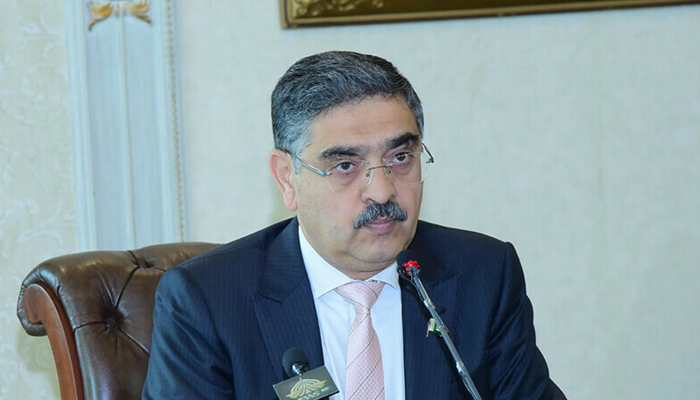PM urges global support for developing nations on climate ambitions
PM urged all nations to raise their climate ambitions, regardless of their statuses and geographical locations
UNITED NATIONS: Caretaker Prime Minister Anwaar-ul-Haq Kakar on Wednesday urged the world to extend financial and technical support to developing countries like Pakistan to help them achieve ambitions on climate change.
The prime minister, addressing the Climate Ambition Summit 2023 on the sidelines of the 78th session of the United Nations General Assembly, urged all nations to raise their climate ambitions, regardless of their statuses and geographical locations.
He told the international community that the adverse impact of climate change continued to rise in frequency and intensity, disproportionately affecting the developing countries.
“Pakistan is a prime example. Despite contributing less than one percent to global warming, we are among the top ten vulnerable countries. The unprecedented floods of last year illustrated this vulnerability but these may just be the tip of the iceberg unless we arrest this global warming,” he remarked.
The prime minister thanked the United Nations Secretary-General Antonio Guterres for active solidarity and mobilization of global support after the floods. He said due to its “well-established” climate vulnerability, the adaptation was a “critical” priority for Pakistan.
He said Pakistan adopted the first-ever National Adaptation Plan to build climate resilience that would follow the projection and casting of interventions identified in the said plan.
He said the second phase of the plan would mark preparing for the sector-specific investment framework to serve as a blueprint to translate and identify the adaptation needs into tangible and bankable projects.
Prime Minister Kakar also highlighted Pakistan’s “Living Indus Initiative” aimed at restoring the ecological health of the Indus Basin.
He said Pakistan took significant steps to enhance the early warning capacity as well as the flood protection plan.
He said despite its no contribution to global warming, Pakistan chose to be part of the solution by deciding to convert 60 percent of its energy resources to alternative energy by 2030 that would cost around $100 billion to the country.
Citing Quranic verses, the prime minister told the world leaders that Islam promotes responsibility to protect the environment and utilise natural resources efficiently and undertake an equitable approach to nature.
Urging the global community to come up with climate actions and support to the developing countries, the prime minister said, “This will be a litmus test of solidarity and perhaps for the survival of our species on our injured planet.”
Addressing a high-level meeting on prevention of global pandemics, preparedness and response, the prime minister highlighted that the Covid-19 had caught the world with surprise, which killed over 6 million people across the globe and led to the national and global economies lockdowns.
The prime minister said that the pandemic also caused several reasons for concerns in the world, including inequity in the vaccine distribution among the rich and the poor, resistance by the corporate sector, insisting upon the property rights, hampering the wider preparation of the vaccine and inequality in the financial support mobilized for the rich and the poor countries to recover from the Covid.
PM Kakar stressed that they must not repeat those aspects in the future pandemic or health crises. The vaccines should be treated as global goods and available to all countries and companies, he emphasised, adding that the commercial companies, private donors and actors should not be put in charge of determining the medical production and distribution of vaccines.
“It should be determined through the intergovernmental negotiations under the auspices of WHO,” he opined. “We should also commit to remove trade barriers, strengthen supply chains and facilitate the movement of medical and public health goods by diversifying manufacturing capacities across the regions and promoting technologies for the developing countries,” the prime minister maintained. “We believe that issue of prevention and preparedness, and response to a pandemic can be best addressed by legally treated through a binding treaty as mandated by the world health assembly, which is currently negotiated in Geneva,” he added. Meanwhile, Caretaker Prime Minister Anwaar-ul-Haq Kakar and President of Uzbekistan, Shavkat Mirziyoyev, reiterated their commitment to promote regional economic integration and resolved to play an active role for inter-regional connectivity. They held a bilateral meeting on the sidelines of the 78th Session of UNGA, PM Office Media Wing said in a press release.
The two sides exchanged views on deepening bilateral cooperation in a range of areas including political, trade, economic, security, defence, and connectivity. The prime minister, while expressing satisfaction at the growing level of bilateral cooperation in the last few years, stressed the importance of sustaining the momentum. He underlined that the operationalization of Preferential Trade Agreement (PTA) and Transit Trade Agreement (UPTTA) would boost trade and transit between the two countries. The prime minister re-affirmed Pakistan’s strong commitment to timely completion of Trans-Afghan railway project. He also noted that regional connectivity, trade, and economic integration would have a stabilizing effect on Afghanistan as well. Both sides also exchanged views on the recent developments in the region and matters related to the regional security and stability.
-
 Detective Chief Inspector Reveals How Andrew Got Treated In Police Custody
Detective Chief Inspector Reveals How Andrew Got Treated In Police Custody -
 Gemini 3.1 Pro Unveiled: Google’s Next-gen AI For Advanced Reasoning & Faster Enterprise Workflows
Gemini 3.1 Pro Unveiled: Google’s Next-gen AI For Advanced Reasoning & Faster Enterprise Workflows -
 Oprah Winfrey Talks About Weight-loss 'tool To Manage' Health
Oprah Winfrey Talks About Weight-loss 'tool To Manage' Health -
 Texas Emerges As World's Future Data Center Capital
Texas Emerges As World's Future Data Center Capital -
 South Korea’s Ex-President Yoon Issues Public Apology After Being Sentenced To Life Over Martial Law
South Korea’s Ex-President Yoon Issues Public Apology After Being Sentenced To Life Over Martial Law -
 Eric Dane Recorded Episodes For The Third Season Of 'Euphoria' Before His Death From ALS Complications
Eric Dane Recorded Episodes For The Third Season Of 'Euphoria' Before His Death From ALS Complications -
 Inside Morning Of Andrew’s Arrest And How He Responded: ‘Do You Know Who I Am?’
Inside Morning Of Andrew’s Arrest And How He Responded: ‘Do You Know Who I Am?’ -
 OpenAI Sam Altman Predicts AI Superintelligence By 2028: Is Humanity Ready For A Turning Point?
OpenAI Sam Altman Predicts AI Superintelligence By 2028: Is Humanity Ready For A Turning Point? -
 WhatsApp Rolls Out Group Message History To Ease Group Chats
WhatsApp Rolls Out Group Message History To Ease Group Chats -
 Tesla Expands Cybertruck Lineup With Affordable Model In US, Slashes Cyberbeast Price To Boost Demand
Tesla Expands Cybertruck Lineup With Affordable Model In US, Slashes Cyberbeast Price To Boost Demand -
 AI Is Not As Powerful As We Think, Says Mathematician Hannah Fry
AI Is Not As Powerful As We Think, Says Mathematician Hannah Fry -
 How Andrew's Feeling Since His Arrest & Subsequent Release Amid Tech & Computers Seize
How Andrew's Feeling Since His Arrest & Subsequent Release Amid Tech & Computers Seize -
 Trump Officially Directs US Agencies To Identify And Release Files On Extraterrestrial Life
Trump Officially Directs US Agencies To Identify And Release Files On Extraterrestrial Life -
 2026 Winter Olympics: Alysa Liu Claims Gold, Snapping 20-year Drought For US Figure Skating
2026 Winter Olympics: Alysa Liu Claims Gold, Snapping 20-year Drought For US Figure Skating -
 Hilary Duff Opens Up About Marriage Fears Despite Strong Bond With Matthew Koma
Hilary Duff Opens Up About Marriage Fears Despite Strong Bond With Matthew Koma -
 ‘Grey’s Anatomy’ Star Eric Dane Breathes His Last At 53
‘Grey’s Anatomy’ Star Eric Dane Breathes His Last At 53




